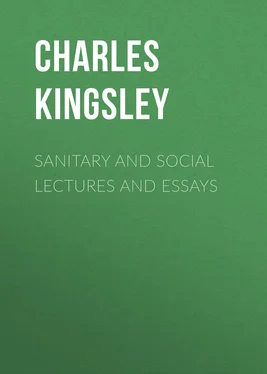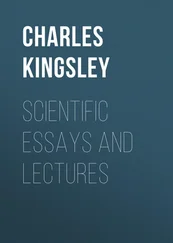Charles Kingsley - Sanitary and Social Lectures and Essays
Здесь есть возможность читать онлайн «Charles Kingsley - Sanitary and Social Lectures and Essays» — ознакомительный отрывок электронной книги совершенно бесплатно, а после прочтения отрывка купить полную версию. В некоторых случаях можно слушать аудио, скачать через торрент в формате fb2 и присутствует краткое содержание. Жанр: foreign_prose, sociology_book, foreign_antique, на английском языке. Описание произведения, (предисловие) а так же отзывы посетителей доступны на портале библиотеки ЛибКат.
- Название:Sanitary and Social Lectures and Essays
- Автор:
- Жанр:
- Год:неизвестен
- ISBN:нет данных
- Рейтинг книги:4 / 5. Голосов: 1
-
Избранное:Добавить в избранное
- Отзывы:
-
Ваша оценка:
- 80
- 1
- 2
- 3
- 4
- 5
Sanitary and Social Lectures and Essays: краткое содержание, описание и аннотация
Предлагаем к чтению аннотацию, описание, краткое содержание или предисловие (зависит от того, что написал сам автор книги «Sanitary and Social Lectures and Essays»). Если вы не нашли необходимую информацию о книге — напишите в комментариях, мы постараемся отыскать её.
Sanitary and Social Lectures and Essays — читать онлайн ознакомительный отрывок
Ниже представлен текст книги, разбитый по страницам. Система сохранения места последней прочитанной страницы, позволяет с удобством читать онлайн бесплатно книгу «Sanitary and Social Lectures and Essays», без необходимости каждый раз заново искать на чём Вы остановились. Поставьте закладку, и сможете в любой момент перейти на страницу, на которой закончили чтение.
Интервал:
Закладка:
The rapid increase of population during the first half of this century began at a moment when the British stock was specially exhausted; namely, about the end of the long French war. There may have been periods of exhaustion, at least in England, before that. There may have been one here, as there seems to have been on the Continent, after the Crusades; and another after the Wars of the Roses. There was certainly a period of severe exhaustion at the end of Elizabeth’s reign, due both to the long Spanish and Irish wars and to the terrible endemics introduced from abroad; an exhaustion which may have caused, in part, the national weakness which hung upon us during the reign of the Stuarts. But after none of these did the survival of the less fit suddenly become more easy; or the discovery of steam power, and the acquisition of a colonial empire, create at once a fresh demand for human beings and a fresh supply of food for them. Britain, at the beginning of the nineteenth century, was in an altogether new social situation.
At the beginning of the great French war; and, indeed, ever since the beginning of the war with Spain in 1739—often snubbed as the “war about Jenkins’s ear”—but which was, as I hold, one of the most just, as it was one of the most popular, of all our wars; after, too, the once famous “forty fine harvests” of the eighteenth century, the British people, from the gentleman who led to the soldier or sailor who followed, were one of the mightiest and most capable races which the world has ever seen, comparable best to the old Roman, at his mightiest and most capable period. That, at least, their works testify. They created—as far as man can be said to create anything—the British Empire. They won for us our colonies, our commerce, the mastery of the seas of all the world. But at what a cost!
Their bones are scattered far and wide,
By mount, and stream, and sea.
Year after year, till the final triumph of Waterloo, not battle only, but worse destroyers than shot and shell—fatigue and disease—had been carrying off our stoutest, ablest, healthiest young men, each of whom represented, alas! a maiden left unmarried at home, or married, in default, to a less able man. The strongest went to the war; each who fell left a weaklier man to continue the race; while of those who did not fall, too many returned with tainted and weakened constitutions, to injure, it may be, generations yet unborn. The middle classes, being mostly engaged in peaceful pursuits, suffered less of this decimation of their finest young men; and to that fact I attribute much of their increasing preponderance, social, political, and intellectual, to this very day. One cannot walk the streets of any of our great commercial cities without seeing plenty of men, young and middle-aged, whose whole bearing and stature shows that the manly vigour of our middle class is anything but exhausted. In Liverpool, especially, I have been much struck not only with the vigorous countenance, but with the bodily size of the mercantile men on ’Change. But it must be remembered always, first, that these men are the very élite of their class; the cleverest men; the men capable of doing most work; and next, that they are, almost all of them, from the great merchant who has his villa out of town, and perhaps his moor in the Highlands, down to the sturdy young volunteer who serves in the haberdasher’s shop, country-bred men; and that the question is, not what they are like now, but what their children and grandchildren, especially the fine young volunteer’s, will be like? A very serious question I hold that to be, and for this reason.
War is, without doubt, the most hideous physical curse which fallen man inflicts upon himself; and for this simple reason, that it reverses the very laws of nature, and is more cruel even than pestilence. For instead of issuing in the survival of the fittest, it issues in the survival of the less fit: and therefore, if protracted, must deteriorate generations yet unborn. And yet a peace such as we now enjoy, prosperous, civilised, humane, is fraught, though to a less degree, with the very same ill effect.
In the first place, tens of thousands—who knows it not?—lead sedentary and unwholesome lives, stooping, asphyxiated, employing as small a fraction of their bodies as of their minds. And all this in dwellings, workshops, what not?—the influences, the very atmosphere of which tend not to health, but to unhealth, and to drunkenness as a solace under the feeling of unhealth and depression. And that such a life must tell upon their offspring, and if their offspring grow up under similar circumstances, upon their offspring’s offspring, till a whole population may become permanently degraded, who does not know? For who that walks through the by-streets of any great city does not see? Moreover, and this is one of the most fearful problems with which modern civilisation has to deal—we interfere with natural selection by our conscientious care of life, as surely as does war itself. If war kills the most fit to live, we save alive those who—looking at them from a merely physical point of view—are most fit to die. Everything which makes it more easy to live; every sanitary reform, prevention of pestilence, medical discovery, amelioration of climate, drainage of soil, improvement in dwelling-houses, workhouses, gaols; every reformatory school, every hospital, every cure of drunkenness, every influence, in short, which has—so I am told—increased the average length of life in these islands, by nearly one-third, since the first establishment of life insurances, one hundred and fifty years ago; every influence of this kind, I say, saves persons alive who would otherwise have died; and the great majority of these will be, even in surgical and zymotic cases, those of least resisting power, who are thus preserved to produce in time a still less powerful progeny.
Do I say that we ought not to save these people if we can? God forbid. The weakly, the diseased whether infant or adult, is here on earth; a British citizen; no more responsible for his own weakness than for his own existence. Society, that is, in plain English, we and our ancestors, are responsible for both; and we must fulfil the duty, and keep him in life; and, if we can, heal, strengthen, develop him to the utmost; and make the best of that which “fate and our own deservings” have given us to deal with. I do not speak of higher motives still; motives which, to every minister of religion, must be paramount and awful. I speak merely of physical and social motives, such as appeal to the conscience of every man—the instinct which bids every human-hearted man or woman to save life, alleviate pain, like Him who causes His sun to shine on the evil and on the good, and His rain to fall on the just and on the unjust.
But it is palpable that in doing so we must, year by year, preserve a large percentage of weakly persons who, marrying freely in their own class, must produce weaklier children, and they weaklier children still. Must, did I say? There are those who are of opinion—and I, after watching and comparing the histories of many families, indeed of every one with whom I have come in contact for now five-and-thirty years, in town and country, can only fear that their opinion is but too well founded on fact—that in the great majority of cases, in all classes whatsoever, the children are not equal to their parents, nor they, again, to their grand-parents of the beginning of the century; and that this degrading process goes on most surely and most rapidly in our large towns, and in proportion to the antiquity of those towns, and therefore in proportion to the number of generations during which the degrading influences have been at work.
This and cognate dangers have been felt more and more deeply, as the years have rolled on, by students of human society. To ward them off, theory after theory has been put on paper, especially in France, which deserve high praise for their ingenuity, less for their morality, and, I fear, still less for their common sense. For the theorist in his closet is certain to ignore, as inconvenient to the construction of his Utopia, certain of those broad facts of human nature which every active parish priest, medical man, or poor-law guardian has to face every day of his life.
Читать дальшеИнтервал:
Закладка:
Похожие книги на «Sanitary and Social Lectures and Essays»
Представляем Вашему вниманию похожие книги на «Sanitary and Social Lectures and Essays» списком для выбора. Мы отобрали схожую по названию и смыслу литературу в надежде предоставить читателям больше вариантов отыскать новые, интересные, ещё непрочитанные произведения.
Обсуждение, отзывы о книге «Sanitary and Social Lectures and Essays» и просто собственные мнения читателей. Оставьте ваши комментарии, напишите, что Вы думаете о произведении, его смысле или главных героях. Укажите что конкретно понравилось, а что нет, и почему Вы так считаете.












